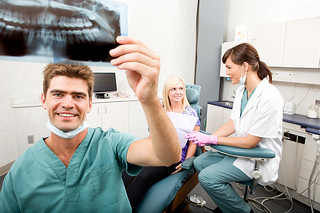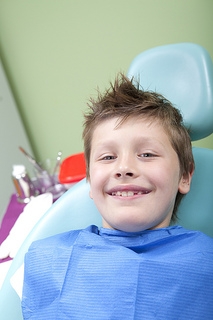May 8th, 2024

Orthognathic surgery is surgery to correct a wide variety of abnormalities of our patients' jaw and teeth. The surgery is often done in conjunction with orthodontic treatment. While the patient’s appearance may be significantly improved as a result, the primary purpose of the surgery is to correct functional problems including but not limited to:
- Unbalanced facial appearance
- Protruding jaw
- Open bite (upper and lower teeth don’t overlap properly
- Excessive wearing down of the teeth
- Difficulty with chewing or biting
- Chronic mouth breathing
- Sleeping problems such as sleep apnea
- TMJ pain (jaw joint pain)
- Restoring facial injuries
Knowing when to start the orthodontic treatment in preparation for orthognathic surgery can also be tricky if our team at our office is treating a teenager. It is important to know when to get started. If orthodontic treatment is initiated too soon and the teenager is still growing, the patient will either need to hold in braces until his or her growth is complete and they are ready for surgery or the braces will have to be removed and then placed again when growth is complete. Neither of these options is attractive since it requires longer time in treatment, which is something all our patients want to avoid. Our team at our office strives to get all patients finished with treatment as quickly as possible because it is healthier for the teeth and gums and gives them a beautiful smile to enjoy for a lifetime.
If you are considering orthognathic surgery or you have been told that you need jaw surgery, give us a call to schedule your initial consultation today. Dr. Daniel Ma and our team at our office will explain our treatment plan in a way you will understand and we will keep you informed every step of the way.
May 1st, 2024

Summer is almost here, which means a season full of vacations, adventures, and great memories is just around the corner for our patients at our office.
Everyone wants a glowing and radiant white smile when the sun comes around and we have a few reminders to keep your pearly whites healthy and beautiful over the summer! Try to stay away from drinks that will stain your teeth like coffee, soft drinks, or dark colored juices. Not only will drinks like this weaken your enamel but they will also darken that fabulous smile you're working on! Another tip is to try and focus on brushing your teeth; everyone knows that when busy schedules start picking up, getting a good brushing session in tends to take the backseat! A good tip for keeping your mouth safe from staining and other possible pitfalls is to rinse your mouth with water after any meal you can’t fully brush your teeth after. Your teeth, inside and out, will benefit!
And remember, whether you are headed to a barbecue, a camping trip, or just having fun in the backyard this summer, we want to hear all about it! Make sure to let us know what you’re up to below or on our Facebook page! We also encourage you to post any photos from your adventures!
April 24th, 2024

Many developing orthodontic problems can be intercepted and corrected if diagnosed and treated at an early age. Dr. Daniel Ma and our team at our office recommend children have their first orthodontic evaluation no later than age seven, or younger if the front four permanent teeth have replaced the baby teeth. Early treatment, also known as interceptive treatment or Phase I treatment, provides both timely detection of problems and greater opportunity for more effective treatment. Early intervention guides growth and development, preventing serious problems later.
If your child is showing these signs, it may be time to think about early orthodontic treatment:
- Early or late loss of baby teeth (your child should typically start losing teeth around age five or six, and will have all their permanent teeth in around age 12 to 13)
- Difficulty chewing and/or biting
- Mouth breathing
- Sucking his or her thumb
- Speech impediment
- Protruding teeth (the top teeth and the bottom teeth extend away from each other)
- Crowded front teeth
- Teeth that don't come together in a normal manner or even at all
Early intervention will greatly reduce the severity of your child’s case, and therefore reduce the length of treatment time and cost for a second phase of treatment when all of his or her permanent teeth have erupted. An evaluation at our Vancouver, BC office will determine if your child’s dental and skeletal growth is proceeding properly or if interceptive treatment is needed. Many times, a more severe problem can be corrected using sophisticated removable appliances instead of traditional orthodontic treatment.
To schedule a consultation for your child to visit with Dr. Daniel Ma, please give us a call! We will provide your child with an initial exam, and discuss with you the best steps to take toward caring for your child's smile.
April 17th, 2024

During the early days of the environmental awareness movement, those who demonstrated against pollution, toxic chemicals, and the general public health were known as hippies. The early 1970s were a time of change, and assertions that we needed to pay more attention to the Earth's atmosphere were generally dismissed. But within a couple decades, it had become clear that the previous generation was right; the citizens of the world needed to become more environmentally conscious.
Many people feel that they can't make a difference if they don't do something big. But caring for the environment doesn't have to be an all-or-nothing concept. In fact, the little things you do can add up to make a great impact, especially in our community. Here are a few ways you can help the environment on Earth Day, April 22nd and all year around.
Four Small Ways to be Environmentally Friendly
- Recycle Your Textiles. Nearly 21 million tons of textiles are added to American landfills each year, according to the Environmental Protection Agency. Donating your unwanted clothing to a secondhand store or an organization that repurposes fabric helps cut down on solid waste and conserves natural resources.
- Reduce Usage of Disposables. Plastic bottles and bags, disposable diapers and other things we can use and toss out are convenient, but they're not necessary. Simply choosing to replace one of type of disposable with a reusable product can help you cut down on waste that has a large negative impact on our environment.
- Conserve Water. If everyone in the United States turned off the water while brushing their teeth, more than 1.5 million gallons of water could be conserved. Turn the water on long enough to wet your toothbrush for brushing and rinsing, and then immediately turn the water off again.
- Turn Off the Lights. Flip the light switch to "Off" if you're going to leave a particular room for 15 minutes or more. This will conserve energy on incandescent light bulbs and cut down on cooling costs.
It's not necessary to be an activist or install solar panels all over your home to help the environment. Although you can do these things, the little everyday measures make a big difference in helping to conserve energy and the environment, while reducing your carbon footprint. Our team at our office wants to remind you to celebrate Earth Day and help the environment, knowing that it will benefit your and your children's generation.





 Website Powered by Sesame 24-7™
Website Powered by Sesame 24-7™